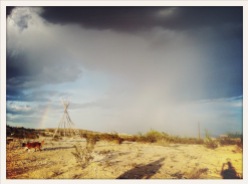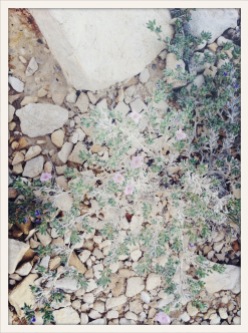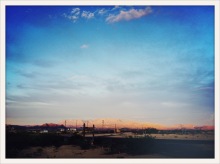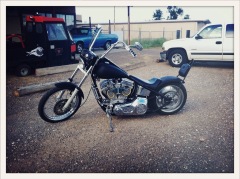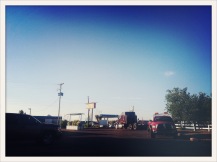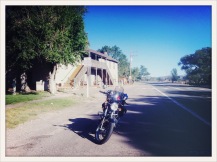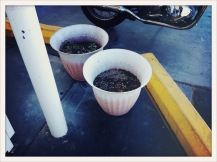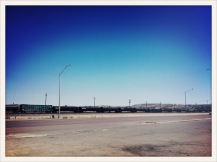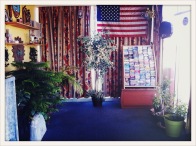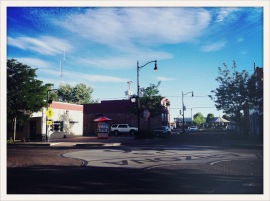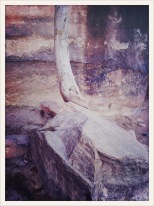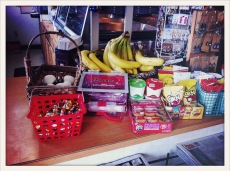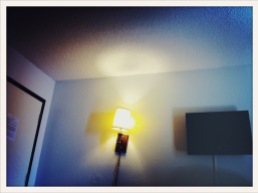Dear A.P.P.S.,
I’m sitting at a desk I made from motel dinner tables and an upholstered chair. You know, the kind with pressed wood, rounded edges, a kind of reddish beige fabric and square shape.
I’m sitting on the bed now, I was sitting at the desk yesterday. That first sentence was the only thing I partially finished when trying to write to you. You and I have said so many things to one another over the past four years. I thought about that time spent, of engaging with certain aspects of our personalities, where we were, when we were, what other people were around, what time it was, were we eating, drinking, sleeping, teaching, dancing, yelling, whispering, sitting, riding, swimming, making art, walking… I could go on about how many variations of settings we’ve been in at the same time. Do you remember when I told the border guard that S and I were your installers, and it was okay since we were Americans? You weren’t allowed to lift a finger if it were in the name of ‘work’. The guard looked at me, and said we were responsible for you. I smiled and nodded as I disagreed, we were responsible for each other I thought. I knew you were afraid of crossing over into the United States.
It takes a long time to get to know someone. It takes time to trust yourself to know you can trust another person in situations where the path isn’t all that clear. That time is privileged time it seems. That time allows us to reveal new ways of seeing based upon our new surroundings, new impressions, new reactions. That time is delicate, in that it reveals past narratives into future narratives, and we decide, then and there, how we will participate within the new space made up by a past, our present, and complicated expectations. I am relieved I can change my mind. I am relieved I can keep my beliefs. I am relieved I can feel a freedom within those shaky boundaries of negotiation. I am aware that it is a privilege I have, but a right that we all deserve to experience.
I just got off the phone with A. A and I could talk for several hours, and neither of us minded. To speak one’s truth is important, even when it is unclear at the start, but at the end comes to some recognizable shape to hold. It takes time for us to talk this way, in the way that we do, working it out, processing the nuances. I credit heartache, tragedy, elation, confusion, love, and happiness as to why we can relate to each other’s words in the way that we do.
When I was riding from Zion, I headed toward Page, Arizona. I read about Lake Powell, and expected it would be a relief, a place I could step my feet into, and feel the cool of the water, spend time outside, and sit. The temperature was going to be 95 or more, but I would push through in the morning hours and try to make it. The highway was long, and red. It seemed slightly elevated, like the way a precarious mound is formed when gophers run through the soil making their tunnels. There were more cars than I’d felt before, more people heading in the opposite direction. The sun was bright, the wind was strong. I crouched down for every gust, my head ducking just below the top of my wind shield, in a kind of determined rhythm as every big truck with eighteen wheels and big trucks with big boats would pass me by. I closed my body into the bike, I tried to become her so the wind would leave my head alone and focus its blows to my torso, our body could take that. I rode with focus, I was no longer singing. This was no vacation cruise, or Sunday ride through river curves, this was a tour of endurance.
My mind drifted, and I went back to my time on the island where I lived in a tent for two months. I thought of my body becoming stronger as I came to run up and down the cliffs of the elevated and rocky terrains. I thought of my body waking up every day alone, listening to the woods at night as the mosquitos and sun would put me to sleep, feeling the ferns on my legs as I moved in and out of shady spaces, down night trails, and slug paths. I could hear the sound of the deer and her babies walking the trail below my camp, and I knew when the raccoons were up high in the tree above just waiting their turn for my scraps. All I could hear was the forest, and the sound of my own thoughts. What was I doing? One morning, I got the call from my parents. I was sitting on a deck that D. and I built. It was planned and placed onto a cliff that overlooked the Georgia Straight. I could see the other gulf islands, a bee was eating my food. “He has to have a stint put into his heart,” Mom said through a glitchy phone connection. My dad made a joke about having to speak up since I was all the way in Canada. He loved that joke. It was late July of 2014. The bee walked along my plate, collecting whatever it was I was eating. I can’t remember. The hemlock trees stood so tall, I wondered how I could see the top if I were that hawk flying overhead. I laid on my side on the wood of the platform, and thought of blue tarps I’d structured on the lower level of the property. I wanted to wrap up inside, and go to sleep, the sun was hot through my wool sweater.
Some friends came to visit the island that week. L. came and sat with me and I cried over the unknown as she read from her fantasy novel about a girl who overcame obstacles. We swam and ate canned fish, and wrapped green things inside tortillas, and drank whisky in the evenings. I was scared, but I wasn’t alone anymore.
I went to Florida in early August of 2014. I arrived to Mom’s office, Dad was to meet us there. When he walked in, he was different. His body was a different one than the one I’d remembered. His skin was thin and pale, his hair whiter, his pants now too big. I was in shock from this difference in appearance, and became angry that I had to share this moment of realization with Mom’s coworkers. They felt like intruders even though they saw him more often than I had these past years. I hadn’t been home in two years or more. Dad and I left, and went to the Village Inn for a meal. He ordered pie and coffee, and I ordered a sandwich. He didn’t finish his pie. I don’t remember what I finished. The operation to insert the stint into his heart was a success, and while one of his valves would remain completely dead, the other two could function with full capacity. We thought he would get back to his old self, start eating again, walking more, and breathing more freely. What no one yet knew, was that he had cancer, that in September of that same year, he would be diagnosed with stage four adenocarcinoma. It is a mysterious disease, that viciously reveals itself in the depths of the body and manifests in a place of weakness. His liver became filled with fluid, and after doctors accused him of drinking, which he never did, they proceeded to make a plan. He and Mom fought to see a specialist.
That September I’d been commissioned to make a site-specific artwork at the semi-public art space ran by 221A artist run centre in Vancouver. It was the first time I would be paid to make art, other than teaching. All I could imagine was making an other space. Like Foucault speaks about, that heterotopic space that was neither bad nor good, just other. The housing situation in Vancouver was on my mind, my being an outsider was on my mind, the room size of 10×10 was on my mind, Ken Lum’s pending piece was on my mind, the tent camps in a nearby park was on my mind, and Galiano Island, blue, and solitude were on my mind. I built a tarp structure by my own hand and had S and S help me. “Performing Construction” was the installation performance of the piece “10x10x10”. It was made from the same blue tarps I’d used on the island. It had treated wood like the wood D and I had used to build a deck on the cliff. It used bungees like those used on my structures. It had a SAD lamp installed like the one I needed in my room. It had a cushioned bed, and a crooked roof with concrete blocks and screws holding it all together. I’d already built it in the park in front of my house to practice, and then took materials by bicycle and a Honda hatchback to the the Semi-public site on Union Street. I wore black as I built, only just finding out that morning of Dad’s diagnosis. The night before I’d come home and found a raven sitting under the overhang of the porch. It was so still, and unalarmed by my presence. I sat with him for hours. The next morning my parents called and told me the news, and that I should come home when I could. I left that November of 2014 and didn’t return to Vancouver until May of 2015. He died January 2015. We sat together everyday. We became closer. He saw me, and I saw him.
I was back in the ride. I looked up. The endless view of traffic lined the distance into a daylight mirage of headlights. I was riding alone in one lane heading into to town when another car maneuvered to pass from the opposite lane and into mine. Judging by the distance away, the driver did not see my one headlight approaching. There was nowhere for me to safely veer, no action but to hug the edge of white paint that outlined the edge of the road, and only a mild drop-off into a desert where I could not find escape. I was afraid, my blood was pumping, and I closed my eyes in a rush of fear, and a glimpse at what could be my end. I held tight to the handlebars as I felt the rush of the car inches from my leg passing me by, squeezing between me and the other truck and trailer. I opened my eyes. Seconds felt like minutes and I realized I was still alive. There was no place to stop and collect myself, and the adrenaline of my body moved me ahead. Thirty minutes later, I rode by Lake Powell and in its blue expanse all I could think of was how I would make this journey end and forego whatever it was I was doing. Blue had no effect. I would finally reach a motel and pass out from exhaustion and a margarita offered at the nearby restaurant. The next day, I told myself I just needed to make it to Flagstaff and then I would quit. I stopped at a gas station and there I fortuitously met two men riding from Mississippi to Sedona. G said they were brothers. They rode beautiful Harley touring bikes with full bags and wore black leathers with colourful patches. At first I was hesitant to talk with them, but their gentle way of speaking helped me feel a comfort I needed. Their sweet southern accents and gentle enthusiasm for what I was doing was motivating. I told them what happened and that I had the fear. People who ride sometimes have close calls and decide never to ride again. They encouraged me, and urged me not to stop and that they would ride with me to Flagstaff before turning off to Sedona. As we rode at my pace, I felt a rush of strength come over me. They waived as they turned off. I waived back to them, whispering in my helmut thank you, thank you. They pulled me away from giving up and I rode all the way to Winslow, Arizona that day. I spent the next afternoon walking around, looking up at the sky, thinking of my Dad’s love of the Eagles and that damn song about Winslow and the girl in a flatbed Ford. A mother and daughter stopped and captured my picture by the statue that people pilgrimage. I smiled and thanked them. It was June 19, father’s day.
……….
I’m no longer sitting at a split desk in Van Horn, Texas. I’m sitting at a desk in Milton, Florida. It’s been nearly six months since I left Texas. Everyday has been a strange kind of beautiful. I am as vexed as I am eased by my current place. It seems there is always more to say, to catch up on. I’m still recounting the time between Page and Van Horn, and Van Horn to here. There are parts I no longer say. I no longer have my own home, a boyfriend, a community who knew me when I didn’t have my childhood and past marriage as a reference. Vancouver was my haven, and I hope I didn’t take it for granted. I truly hope that I didn’t.
Until next time we eat chips virtually, or talk about my makeup, or how to wear my hair for a date. Until then. So glad you are in love now, what a wonderful thing.
Love and All,
Felicia
















